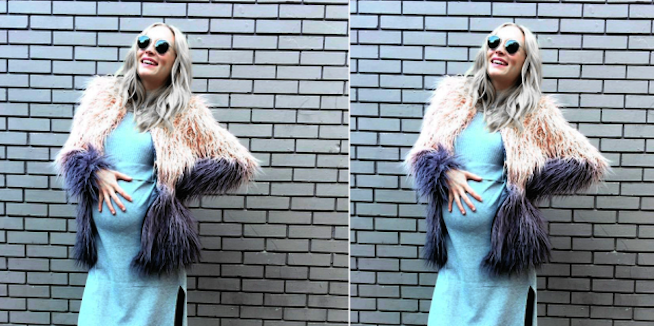
And if I were to get pregnant, I'd do it again.
You've seen the ads on Facebook. "If you used Zoloft during pregnancy and your baby was born with a birth defect, you may be entitled to compensation." Pfizer is accused of hawking the drug to pregnant women despite known risks, including "holes in the heart, cleft palate, club feet, spina bifida, skull defects," and other medical conditions.
Zoloft's long been known as the safest antidepressant to take during pregnancy. Most psychiatrists consider that if the patient needs drugs, Zoloft should be the first line of attack. And yet, some risks exist — some risks always exist.
And I chose to take them — not once, not twice, but three times. I popped Zoloft along with Wellbutrin, through each of my three pregnancies. Wellbutrin is a category C drug. That means no harm is found in animal studies but they can't totally rule out harm to human fetuses.
I rolled the dice. I had to.
When I was pregnant with my first son, I got sick. And not a genteel hurl-in-the-morning sick. I got all day, can't-keep-food-down, barf-so-hard-I-peed sick. I was using a midwife at the time because I believed in natural medicine. But all her essential oils and magnesium supplements couldn't keep food in my stomach. So we went to the doctor, who prescribed Zofran.
Unfortunately, he didn't take a full medical history when he did. One of Zofran's side effects is crippling, suicidal depression, which I'd suffered in the past. When I popped that first pill, we didn't know it but I was on the fast train to Bluesville.
The depression started immediately.
I began crying at pretty much everything. We chalked this up to normal pregnancy issues. My husband decided to go to a multi-day concert and I spent the three days he was gone utterly convinced he was going to die. I'd call him and sob myself breathless, beg him to come home, cry so hard my eyes dried out. Because I'd been depressed and untreated before, we didn't do anything about it.
Then the panic attacks started. My chest tightened; I gasped for breath like a hooked fish. I shook. My teeth chattered. I tried to tell my husband what was happening, but I couldn't make the words string together.
After the third time this happened, we agreed this wasn't normal and asked the midwife for help. Again, her essential oil worked about as well as snake oil. She kept recommending some Electronic Freedom Technique that seemed to involve hippie nonsense I wasn't having.
So we went to the doctor again. She made me an appointment with a psychiatrist and gave me Vistaril, a mild anti-anxiety med. The psychiatrist prescribed cognitive behavioral therapy and Zoloft. "It's the safest for pregnant women," she said.
I'd like to say I stalled. I'd like to say I'm not a "take all the drugs" type. But if I stub my toe, I go for the Tylenol. We vaccinate. I dose my kids with Motrin at the first sign of teething. If popping a pill will fix what ails me, I pop the pill.
Sure, I weighed the risks. I weighed it against how much I wanted to kill myself but didn't because of the baby. And I popped the pill.
I stayed on Zoloft all through my pregnancy. We worried a little about withdrawal syndrome, in which a baby has "jitteriness, vomiting, constant crying, increased muscle tone, irritability, altered sleep patterns, tremors, difficulty eating and regulating body temperature and some problems with breathing."
Sounds scary. But it's usually mild and it doesn't happen in all cases. And surprise, surprise: despite me taking the drug all the way up to delivery, my son latched on right away, slept like the proverbial baby, and had absolutely zero of the issues detailed above.
I stayed on the medication postpartum, partly as a protective measure against a resurgence of depression, and partly because we realized I'd been depressed my entire life and this was the first time I felt close to normal.
So it wasn't a question that when I got pregnant with my second son I'd stay on my meds. In fact, we added another: Wellbutrin. Zoloft gave me what psychiatrists call a "flat affect"; I wasn't depressed, but I wasn't exactly happy, either. The risks were thought to be minimal, if nonexistent. So I popped that one, too.
After a precipitous labor, baby number two came out with ten fingers, ten toes, and no ill effects from my medication.
New studies show that antidepressants may cause a rise in autism. While the study doesn't account for the mothers' actual taking of the drugs (only filling the prescription), and severely depressed mothers are more likely to have children with autism, the results are worrying.
Unfortunately, my depression has been diagnosed as treatment-resistant. That means exercise and psychotherapy — the standard recommendations — won't help me. I need drugs. And if I need them, I need them. My health is as important as my child's, and no one is helped if I decide to take a header off a bridge.
I'm worried this last study will shame mothers into dropping their needed medications. I'm worried about the barrage of "natural" cures I already face burgeoning even more. But most of all, I worry about the moms who will shy away from necessary help because of the risk of autism.
Autism isn't the end of the world. To suggest so is offensive to the millions of people with autism, and their families and caregivers. I'd rather have a live son with autism than be dead — and my child with me.
Some people are going to disparage my choices. They'll assume that any drug would affect a developing fetus and that a psychotropic drug must have some effect on a fetus's developing brain. But we don't know what it is yet because studies aren't long-term enough and because we don't know what to study yet.
And when that day comes, I'll apologize profusely to my three sons because I drugged the third one in utero, too.
But we made the best choice. We know that depression during pregnancy increases a child's risk of mood disorders. Untreated depression may lead to behaviors, like poor nutrition, that affect a mom's ability to care for her growing baby. And according to American Pregnancy, babies born to depressed mothers may be "less active, show less attention, and be more agitated."
Basically, the risks of not taking meds outweighed the risks of taking them. And while I wish therapy could've solved my depression, it didn't. I have a chemical imbalance untouched by cognitive behavioral therapy; hence, the drugs.
I don't regret one pill I popped during all three of those pregnancies. And when I get knocked up again, I'll keep taking my meds. I'm worth it — and so is my baby.
This article originally appeared at Your Tango. Also from Your Tango:
A Guide To The BEST Birth Control For Every Type Of Woman Out There
I'm A Mother Of 2 Boys, And I Can't (And Won't) Support Feminism








